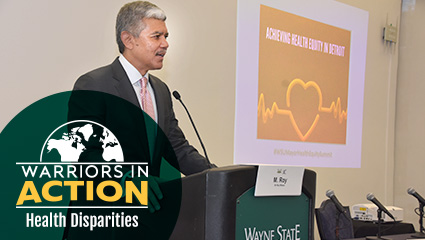 Earlier this year, Wayne State University hosted the inaugural Mayor’s Summit on Health Equity in Detroit. It was the beginning of an important dialogue between the university and city officials, community leaders and health care providers about the significant health disparities in the city.
Earlier this year, Wayne State University hosted the inaugural Mayor’s Summit on Health Equity in Detroit. It was the beginning of an important dialogue between the university and city officials, community leaders and health care providers about the significant health disparities in the city.
Detroit has the highest asthma rate in young children among America’s 18 largest cities. Many other diseases and conditions — including heart disease, diabetes and HIV — also affect Detroiters at a disproportionately higher rate than the rest of America. The reverberations from these health disparities are felt in Detroit’s educational system and economy, and if we are to achieve a true revitalization of Detroit, we need healthy students in the classroom and productive workers on the job.
As Michigan’s only urban, public research university, Wayne State has made it part of its mission to positively impact local and global communities. We are uniquely positioned to do just that by improving the health of Detroiters and, ultimately, achieving health equity.
A recognized leader in Detroit’s revitalization, Wayne State has made a substantial investment in a healthier city, dedicating more than $200 million to health disparities alone.
The Wayne State School of Medicine, centered in the heart of the city, has dedicated itself to developing physicians who will transform the promise of equal health for all into a reality. To support this vision, the university dedicated millions of dollars annually to Wayne Med-Direct, a program aimed at developing a pipeline of high-quality students from disadvantaged socioeconomic backgrounds who are interested in studying health disparities. The new scholarship program guarantees incoming freshmen advanced admission to the School of Medicine, along with four years of paid undergraduate tuition and four years of paid medical school tuition. As we advance toward becoming a national hub for health disparities research, it is crucial to get future medical practitioners and clinical scientists committed to Wayne State as soon as possible.
In addition to attracting top-tier students with an interest in health disparities, I have worked together with university faculty and industry experts to realign the university’s numerous research divisions to emphasize team science and cluster hiring of scientists.
Disparities in health are caused by a multitude of interconnected factors. Housing, education, public safety, transit and economics all contribute to this difficult issue facing Detroit and other urban centers. The opening of Wayne State’s $90 million Integrative Biosciences Center (IBio) last year reflects our efforts to tackle the complexities of health inequality through multidisciplinary research teams. Faculty members with expertise in environmental science, bio and systems engineering, heart disease, diabetes, obesity, asthma and biobehavioral health are working side by side at IBio.
These researchers, and others throughout the university, have an opportunity to create a national center of excellence for a number of the diseases ailing Detroit’s population.
Achieving health equity in Detroit will take time, but I am emboldened by the progress we have made in recent years thanks to your support. The mere pursuit of this goal exemplifies the values — collaboration, integrity, innovation, excellence, and diversity and inclusion — that make Wayne State such a vital institution.
M. Roy Wilson
President, Wayne State University
Over the coming months, look for videos, stories and events that feature some of the many Wayne State initiatives and passionate individuals committed to eradicating health disparities. This content is part of WSU's Warriors in Action campaign highlighting how Wayne State is making a difference.